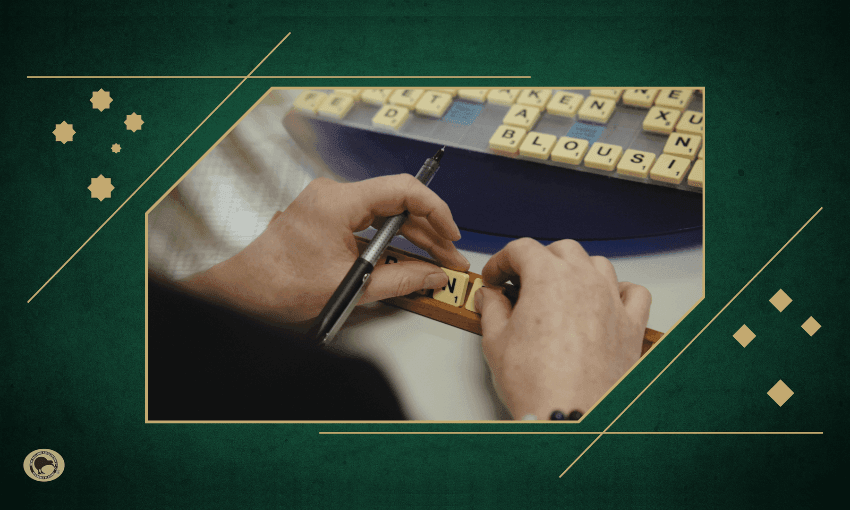In an Antipodean first, the Bledisloe Cup of Scrabble is streaming live on YouTube all weekend. Here’s how to watch and everything else you need to know.
What’s all this then?
It’s Scrabble as you’ve never seen it before! Unless you already watch Scrabble online, in which case it’s Scrabble exactly as you’ve seen it before but with a lot more New Zealanders and Australians. In other words: for the first time in New Zealand Scrabble history, a tournament is being live streamed on YouTube. Games kick off at 9am Friday-Sunday – watch here:
Sunday:
Saturday:
Friday:
What’s the Trans-Tasman Scrabble Challenge?
The Trans-Tasman Scrabble Challenge is a biennial tournament in which 12 of the best New Zealand Scrabble players face off against 12 of the best Scrabble players from across the ditch. It’s a three-day event, with every player playing 24 games, facing each of their trans-Tasman opponents twice. The winner is the nation with the most collective wins at the end of Sunday (there are some individual honours – top player overall, top NZ player – on the line too).
How does the live stream work?
One game each round will be played on a table rigged up with several cameras, showing us the board and the tiles on each player’s rack. Other important information will also be displayed on screen, like the score and which tiles are left in the bag. Games will be commentated by Scrabble players from Australasia and overseas – if you do watch Scrabble online already, you’ll probably be familiar with Canadian player Josh Sokol (a big name in Scrabble circles!) who is commentating the Friday morning session. It’s a very similar set-up to what you’ll see on Scrabble Twitch, Let’s Play Scrabble YouTube and other popular international Scrabble streams.
What are the rules?
The standard tournament Scrabble rules apply. Each player gets 25 minutes each per game, timed on a Chess clock. If a player uses all seven tiles on their rack in a single play this is called a “bingo” or “bonus word” and they get an extra 50 points. If a word is challenged successfully (i.e. it’s not in the (CSW19) dictionary) the player who played it loses that turn. If a word is challenged unsuccessfully (i.e. it is in the dictionary), the player who played it gets an extra five points. There are plenty of other rules which may or may not come into play, and will be explained by the commentators if and when they do.
Who’s playing?
If you enjoyed the documentary Every Word Counts on The Spinoff last year (fun fact: director Alexander Gandar is also one of the driving forces behind this live stream), you might spot a couple of familiar faces in Dylan Early and Lawson Sue. The New Zealand team is captained by Dylan’s good friend / Scrabble nemesis Howard Warner, winner of the 2024 Nationals and number two ranked player in New Zealand. The current New Zealand number one, Chris Tallman, is playing in his first Trans-Tasmans after moving here last year, while at the other end of the experience spectrum, Patrick Carter has played in all 13 editions of the tournament dating back to 1996, and has just returned from representing New Zealand at the Bridge World Championships in Argentina – a double international!
Where’s Nigel?
Ah, yes. The greatest Scrabble player of all time, the subject of several fascinating feature articles and YouTube videos, Nigel Richards is, of course, a New Zealander. So why isn’t he playing in the Trans-Tasmans? At a guess, probably for similar reasons to why Steven Adams never plays for the Tall Blacks. The mythical and notoriously media-shy world champion has lived in Malaysia for quite a few years now, and there are bigger tournaments offering greater prize money to be played in that part of the world. He last played in a Trans-Tasmans back in 1998 (New Zealand won that year) and may yet be lured back one of these days, you never know.
Who’s going to win the Trans-Tasmans this year?
History favours the Australians – they’ve won 10 previous Trans-Tasmans to New Zealand’s three, and New Zealand hasn’t won one since 2010. But, if I was a betting man (and if it was possible to bet on Scrabble) I wouldn’t hesitate to put $20 on New Zealand this year. Call it a hunch, but I think Scrabble’s coming home.
I want to play!
Good news: there are Scrabble clubs scattered around New Zealand, and they are all delighted to welcome new players of all ages and abilities. There’s also a weekly online Scrabble club on Tuesday nights where you can test yourself against other keen Scrabblers around the country.
Most tournaments on the New Zealand Scrabble calendar are open to all comers – in fact, the Trans-Tasman Challenge and the Masters are the only two that are invitation only. The others are all graded, so everyone plays against opponents of a similar level (newcomers are at no risk of getting blown off the board by Trans-Tasmans players, in other words).
You don’t even need to be a member of a club to enter a tournament – though the practice will certainly help. (Author’s note: I started going to Scrabble club in December last year (inspired by watching Every Word Counts), played in my first tournament in January and can now call myself the 91st ranked Scrabble player in New Zealand. This could be you!)

